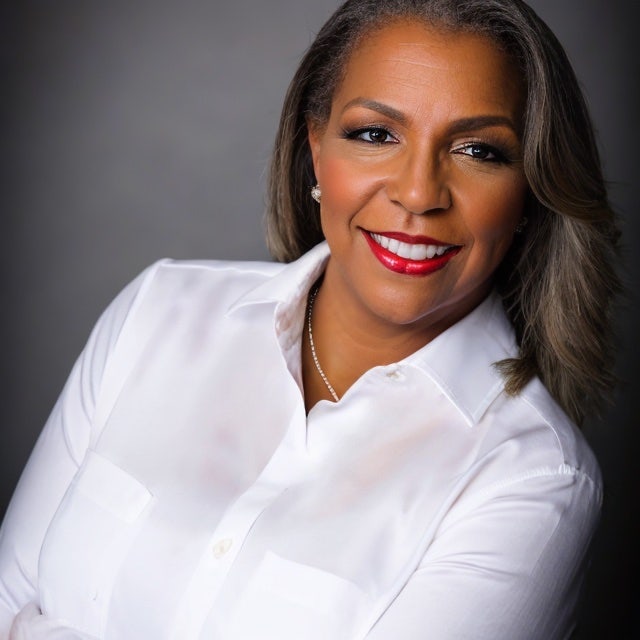Driven by Purpose: Maryville Grad Works to Improve Healthcare Access in Her Community

Trish H. has always felt a calling to make healthcare more accessible for the people in her community.
She began her career as a school nurse, where she discovered a deep passion for public health — especially in supporting mothers of low-birth-weight babies in the District of Columbia.
“I found that I really and truly liked public health,” she recalls.
Following the events of Sept. 11, 2001, Trish was inspired to further her education, earning a Master of Science in Nursing with an emphasis in disaster planning and disaster management.
“I worked with a charter school to develop their disaster and evacuation plans,” she says, “and also partnered with the D.C. school system to review their emergency protocols.”
While continuing to work in nursing leadership roles — managing a team of community-based nurses — Trish remained committed to addressing gaps in care. She began to seek an opportunity to make an even greater impact by becoming a nurse practitioner.
And since earning her master’s, she has continued a path of lifelong learning as she expands into other areas of nursing, advances in the field, and works to provide better care to more people.
Taking a major step into adult-gerontology nursing
Wanting to shift her focus from pediatrics to working with older adult populations, Trish decided to pursue her Adult-Gerontology Primary Care Nurse Practitioner (AGPCNP) post-master's certificate from Maryville University.
She says she chose Maryville not only for its academic excellence but also for its supportive environment.
“I looked for a school that would align with my own personal goals, morals, and belief system, and that’s how I ended up at Maryville University,” she says. “The teachers were great, and I thoroughly enjoyed my cohort. Five years later, we’re still in touch. We call, check in, celebrate wins and losses — there’s a real bond.”
After earning her certificate, she began working with Optum Healthcare, providing home visits to Medicare and Medicaid patients — helping improve outcomes for underserved populations.
“It can be hard when you’re just starting out as a nurse practitioner,” she says. “Even with all my years of experience as a nurse, it felt like starting over. But that role helped me continue doing meaningful work while building confidence.”
Later, she made the transition into primary care, but she wasn’t finished yet. Her original goal, to become a family nurse practitioner (FNP), remained on her mind — so she went back to pursue further post-master's education and certification.
Expanding her focus once more into family practice
When deciding where she would earn her Family Nurse Practitioner post-master's certificate, Trish saw Maryville as the logical choice.
“I knew what I was getting at Maryville,” she says. “I knew there was a team behind you and all you had to do was reach out. It was a place that saw you as a whole person and treated you with mutual respect.”
Even though she studied online, Trish felt deeply connected to her cohort. They met regularly to study and support one another.
“The bravest thing that a human can say is ‘I need help.’ And you felt safe at Maryville to say ‘I need help’ and know that you’re going to get help and not be looked at as though you’re less than,” she says.
As an older student facing personal transitions — her husband had to relocate to care for his mother, leaving her to live alone for the first time — Trish credits her instructors for being especially understanding during that period.
“That was really different for me, and the instructors I had during that time were so very helpful,” she says.
New opportunities in leadership
Earning her FNP certificate has opened new doors for Trish. She now serves on the District of Columbia Board of Nursing, where she contributes to shaping healthcare policy.
“Soon after I joined, we updated the APRN regulations for D.C.— I was proud to be part of that,” she says. “I now attend national state board conferences representing D.C. and engage with policymakers and regulators throughout the country.”
Acknowledging that nurses can work in silos, Trish is thrilled by the ability to work in a group that creates and drives positive change in the field.
“Having the ability to affect policies moving forward is, for me, essential,” she says.
A vision for the future
Since completing her FNP, Trish went on to earn a Doctor of Nursing Practice, focusing her research on how nurses perceive and support peers struggling with opioid addiction.
Today, she works in urgent care and is planning her next big step — opening a practice of her own.
Her future clinic will focus on providing primary care for individuals with a history of opioid addiction — people who often struggle to find compassionate providers.
Still, Trish’s heart remains with the children in her community.
“I work with a few charter schools and some local coaches,” she says. “I offer sports physicals at a nominal cost — just enough to cover gas, really. But it means the kids can play, stay engaged, and succeed. Kids in sports do better in school and stay out of trouble.”
Secrets to success: Never stop learning
Trish’s advice to aspiring nurses and students? Never stop learning.
“The most important gift you can give yourself is to continue to learn, continue to read, and continue to study,” she says.
She encourages prospective students to reach out to others in their field, even before enrolling. And once you start an online program, don’t isolate yourself.
“Online learning is solo learning and can be very lonely and challenging, but if you’re mindful about creating a community among the people in your particular major, that will make life so much easier and help you become really connected to the school itself,” she says.